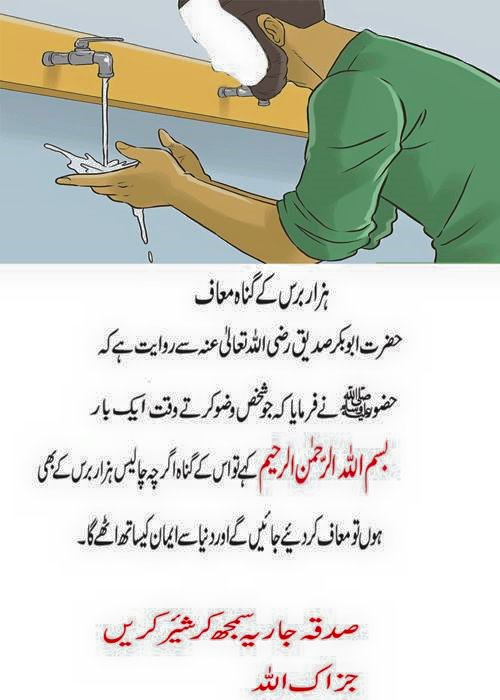Dear Sir,
I’m attaching herewith a picture of a post on facebook. I come across similar posts regularly and it greatly worries me. According to the words in the picture, it has been attributed to the Holy Prophet (PBUH) that if you recite Bismillah while performing wazoo (ablution), your forty thousand years of sins would be pardoned. I just? cannot comprehend this. It is also very difficult for me to ignore it, that is why I am writing to your esteemed paper, so that some knowledgeable person having genuine understanding of our dear religion can explain this. If the inscription in the picture is not genuine, then why do Ulema Kiram keep quite about it. Instead whenever I read such posts on facebook, the comments column is filled with comments like, Subhan Allah, Masha Allah, Allah Akbar, etc. Allowing such narratives go unchecked is harming our religion more than anything else. .. Faridul Haq, Chitral 01 Apr 2018

4 thoughts on “Is this a genuine narrative of an Islamic teaching?”
Agreed. Such narratives are sponsored and promoted by those who do not want Muslims to become strong in character. They prescribe short cuts to wash off sins so that Muslims keep committing sins in the hope that the sin will be pardoned by following one shortcut or the other, and that muslims are not able to develop a strong character by abstaining from sins. These people want muslims to remain ‘guftar kay ghazi’ instead of ‘kirdar kay ghazi’ and be considered as people of low character by other people of the world.
Character has a direct relationship with the narrative/hopes of pardoning of sins (specially sins against huqooq ul Ibaad) through observing rituals. When a person is told that his sins will be forgiven by following a certain ritual, he/she would not make effort to abstain from sins and thus will become a habitual sinner.
Our stress on different aspects of Islamic teachings should be re-prioritized.
Some years back I went for Friday prayers to own ancestral mosque with new shoes on. After the prayers I did not find the shoes. I came home bare-footed.The Imam came to know and visited me to sympathize (Mind you I am using the word sympathize not apologize). I was eager to hear his remarks. He laughed it away and said that it was ‘Rizq’ of that person and that I could afford more shoes. I couldn’t help yelling at him and telling him that on this occasion he should be crying and not laughing. I told him that this is what character building you have done through the mosque. I also told him squarely that leading prayer is not merely a hollow ritual (naoozu billah) but it should reflect on the everyday lives of his followers. He promised me to talk about character building in the mosque after that.(i will not mention how much did he keep his promise).
What will be measured or audited on the day of Judgement? Our deeds.
How do we know about a person? Through his/her deeds. It is our deeds that make our environment heaven or hell.
How do we identify a person in practice of his/her religion? His/her behaviour i.e. deeds.
A person who is in practice of his/her religion has to be a sort of person that people get attracted to his/her thoughts, words and deeds. In other words he/she will be very likeable and lovable type of person. A person whose good deeds will make others to copy.
What is the topmost concern in the mind of Muslims at all the times? Whatever I say, whatever I do, how am I going to account for it on the day of Judgement if it is wrong. Consequently udl wul ehsaan has to be in the deeds of a Muslim. Udl wul ehsaan is a recipe of achieving peace.